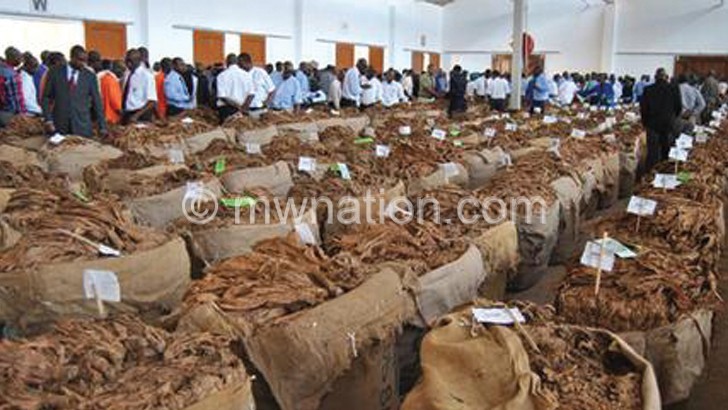Malawi tobacco faces new threat
Malawi’s tobacco industry faces another blow as most of its major markets are contemplating banning the sale of mint-flavoured cigarettes, a move which will likely impact the declining global demand for the crop.
The Food and Drug Administration (FDA) of the United States of America (USA) government has announced that it is working towards issuing proposed product standards to ban menthol, which is blended with burley and flue-cured tobacco as a characterising flavour in cigarettes and ban all characterising flavours in cigars.

The decision by FDA is said to be based on “clear science and evidence” establishing addictiveness and harm of the tobacco products and builds on previous actions that banned other flavoured cigarettes in 2009.
The ban of menthol cigarettes was revealed on Thursday in Lilongwe during a panel discussion organised by the Malawi Agriculture Policy Advancement and Transformation Agenda (Mwapata) Institute under the theme If Not Tobacco, Then What?”
In his presentation, Mwapata research fellow Makaiko Khonje said the proposed ban poses another blow to the tobacco industry, which is already reeling from other external shocks.
He said: “Potentially, we might not be assured of certain markets for our tobacco.
“Other countries are banning menthol as we speak and the US has already proposed the ban and other countries such as Brazil, Ethiopia, the EU [European Union] and the UK [United Kingdom] are also following suit.”
In an interview, Ministry of Agriculture controller of agriculture services, Alexander Bulirani, agreed that the US government ban is a cause for concern for Malawi as a tobacco growing country.
Menthol cigarettes are blended using burley and flue-cured tobacco, which Malawi produces and heavily relies on for its export revenue. USA is a major importer of Malawi’s tobacco.
The ban of menthol cigarettes comes barely a year after the US government suspended imports of Malawi tobacco over child labour allegations through what is known as a Withhold Release Order, the prevention of goods made with forced labour from entering the US market.
On her part, Foundation for a Smoke-Free World-Agricultural Transformation Initiative country director Candida Nakhumwa said tobacco continues to experience declining demand globally with increased efforts to reduce tobacco harm.
She said: “As a country that heavily depends on tobacco for our export earnings, we have witnessed tobacco companies plunge into crisis and the value of our tobacco sales dwindling year-on-year.
“We no longer have the luxury of time. We need to urgently diversify.”
FDA argues that menthol flavour makes it easier for those trying their first cigarette to
become addicted and then makes it tougher to quit.
The current death toll from smoke-related diseases in the US alone stands at about 480 000 per year.
According to FDA, a ban on menthol cigarettes could potentially save 633 000 lives by 2050.
Historically, tobacco sales account for about 60 percent of Malawi’s total export value.
Besides this, the livelihood of many tobacco growers continues to depend on the commodity, which now faces declining international demand owing to global anti-smoking campaigns and child labour concerns.
Tobacco revenues have declined from around $400 million (about K468 billion at the current exchange rate) in 2010 to $174 million (K136 billion) in 2020.
During the opening of this year’s tobacco marketing season on April 20, President Lazarus Chakwera directed the Ministry of Agriculture to begin consultations and embark on a “radical search” for a basket of alternative crops that should replace tobacco by 2030.
The President also echoed the same sentiments on May 12 during his State of the Nation Address in in Parliament Lilongwe, saying while tobacco remains Malawi’s main foreign exchange earner, such reliance is now threatened by declining demand worldwide.
He said: “Inf fact, this year we anticipate earnings below $200 million (K156 billion]. This is enough evidence to make us think twice.”





